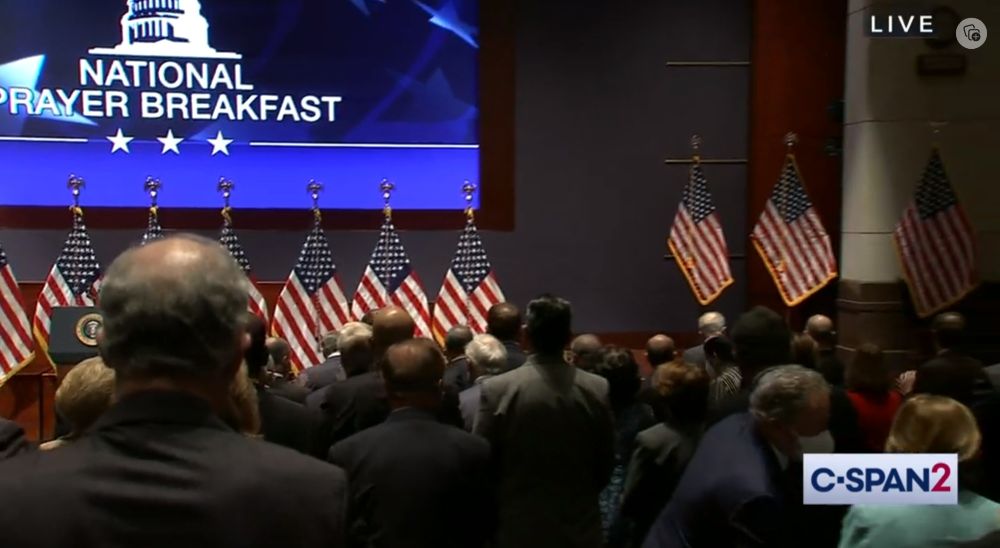How do we reconcile faith and politics in the public square? The founding fathers wisely put some distance between church and state. To bring religious certitude to the political arena or to wrap religion around a political agenda only raises doubts about the integrity of either.
So how is it that the National Prayer Breakfast (NPB) has avoided these traps? For 70 years, this tradition has brought together political leaders, including every president who has participated since 1952, in a spirit of faith that transcended the political beliefs on all sides. Over the years, small groups of senators and representatives would meet weekly in a genuinely bipartisan setting that committed to prayer for one another and reconciliation. That went on to become the National Prayer Breakfast.
On the first Tuesday of February every year, 3,400 people (including 1,500 foreign leaders) would pour into the grand ballroom of the Hilton Hotel in Washington, D.C. The program would typically include the sitting president, a featured speaker, cabinet officials, and Members of Congress. Beyond the Thursday morning breakfast, there were three days of related activities at the Hilton Hotel and on Capitol Hill.
Now all this is in question. This year marked an abrupt change in this 70-year tradition, which traces its origins to the Pacific Northwest. Due to the COVID shut down in 2019, the NPB had to cancel its sessions for several years. Another blow was the passing of Doug Coe, who, for 40 years, had shepherded the NPB to be fully non-partisan and even neutral on religion. There was no one prepared to replace Coe. As a result, today’s NPB is struggling with the absence of leadership. Some are eager to step in and reshape it as was on display this year.
As reported in the Washington Post, “one of the most visible and long-standing events that brings religion and politics together is splitting from the private religious group that had overseen it for decades due to concerns the gathering had become too divisive.”
The new organizer and host of this year’s breakfast is called the National Prayer Breakfast Foundation headed by former U.S. Senator Mark Pryor, D-Arkansas. As one who has faithfully participated in the NPB since my arrival as congressman in 1975, I witnessed these changes, some of which are disturbing. The most dramatic was having two separate events. One would be on Capitol Hill this year hosted by the House Prayer Group (next year, the Senate Prayer Group). It would be limited to Senators and House members, each allowed to bring one guest (I was Rep. Derek Kilmer’s guest and we were joined by newly elected Rep. Marie Gluesenkamp Perez).
At the same time, the newly created National Prayer Breakfast Foundation organized the more traditional event with 1,500 people gathering in the Hilton Hotel’s large ballroom. The Capitol Hill breakfast was less formal, with lively music (Brooklyn Tabernacle Singers) and featuring President Joe Biden. The bipartisan co-hosts each selected a guest speaker, one a Bishop the other a pastor. Having clergy at the podium giving sermons was unprecedented, as guest speakers in previous years talked about their personal experience.
The more traditional prayer breakfast at the Hilton Hotel placed distinguished guests at a head table. The video of President Joe Biden’s talk was followed by the King of Jordan, Abdullah II (his spouse was also a featured speaker), another video, this time the Ukraine President Volodymyr Zelenskyy. As in past years, there was the International Luncheon (90 countries represented), two large dinners and a number of other get-togethers.
The stand-out international example this year was Ukraine, where about 500 delegates of the Ukrainian diaspora and a large delegation from that country attended a Ukrainian Prayer Breakfast (with U.S. Senate & House Members), a forum for Ukrainian-American Partnership, and a Friday Gala-dinner.
What will be the future of the National Prayer Breakfast? It is still viewed favorably, but there is now a lack of leadership and certainty. In the 70-year history of the NPB, Billy Graham has been the only clergyman participating – until this year. I also worry that a House Member could put on the stage a right-ring evangelical who would wrap faith around a political agenda.
The NPB’s grand tradition has Northwest roots. It started in Seattle in 1943 with Abraham Vereide, a Norwegian circuit-riding pastor who brought togther business and organized labor leaders to deal with the Great Depression. (That ultimately led to the founding of the Goodwill Industries.) In the Vereide group was Arthur Langlie, who hosted the first Mayor’s Prayer Breakfast and later the Governor’s Prayer Breakfast, which quickly spread to other states and ultimately in Washington, D.C. and the National Prayer Breakfast in 1952. Ultimately Oregonian Doug Coe did far more to shape what it has become in recent years.

We are running out of common ground for legislators to form social bonds. One earlier effort was a weekend in Hershey, PA, with spouses. Before Congressfolk headed home each Thursday night, there used to be sideline friendliness watching kids play soccer. A local example was the Seattle 10, a friendly, coordinating group of Seattle legislators, Ds and Rs, creating a kind of urban caucus. I doubt that religion, now so polarized, can remain a peaceable ground for truce.
And before that members had homes in DC and their spouses/significant others and children stayed in DC and socialized. Amazing result – hard to get angry at someone when there is a family unit spending time together. Recalling members softball games in Georgetown with Senator Jackson’s, Mansfield, Kennedy and Republicans gathering on ball field near K Street.